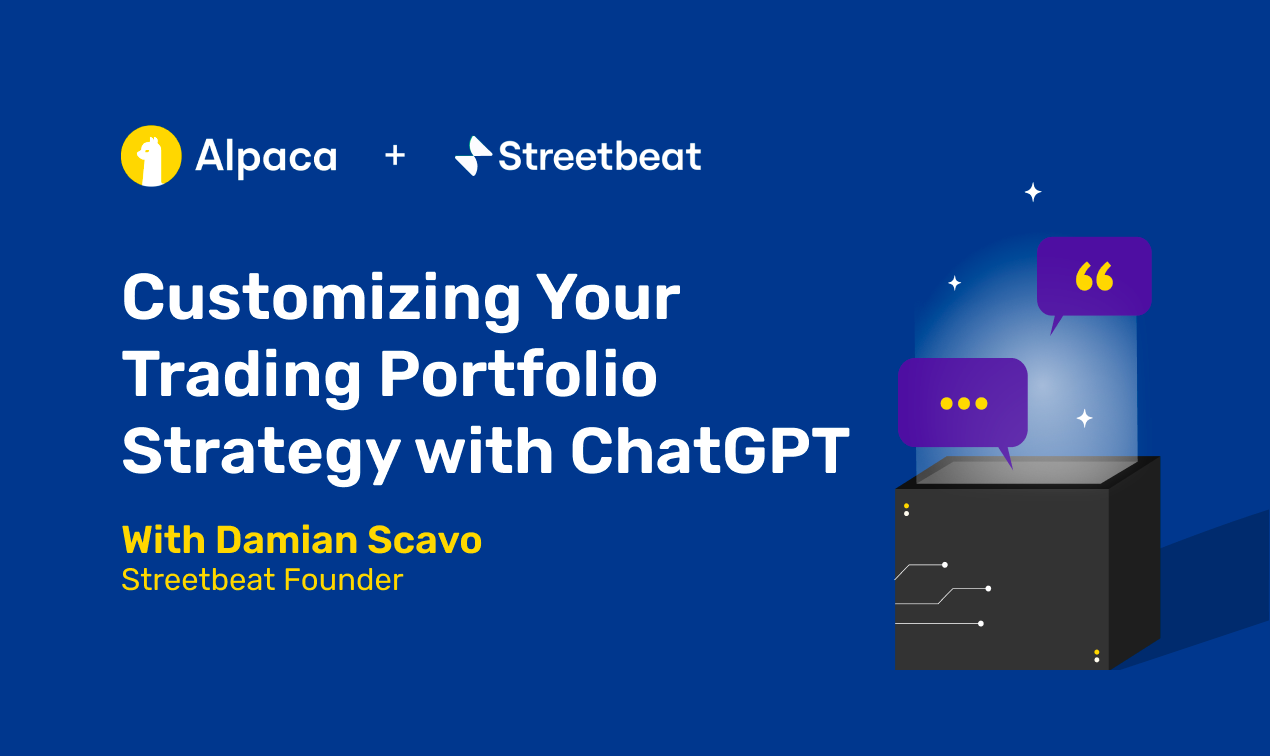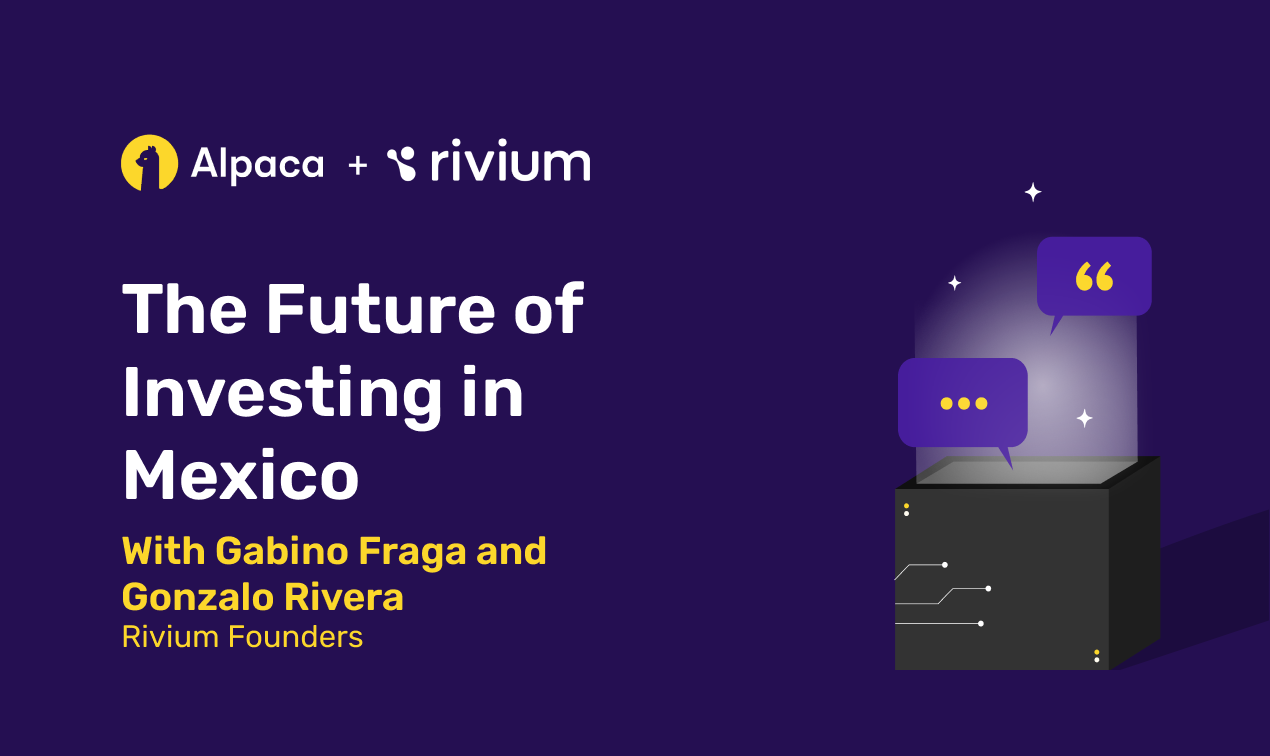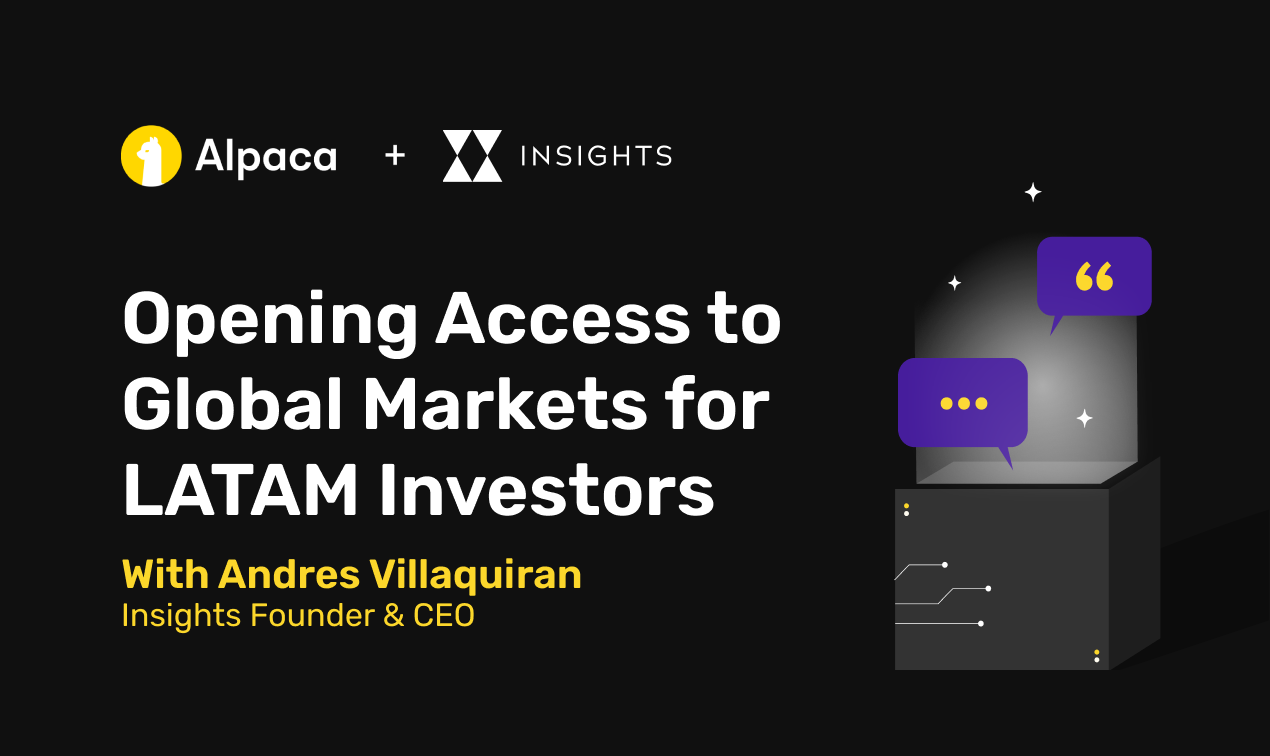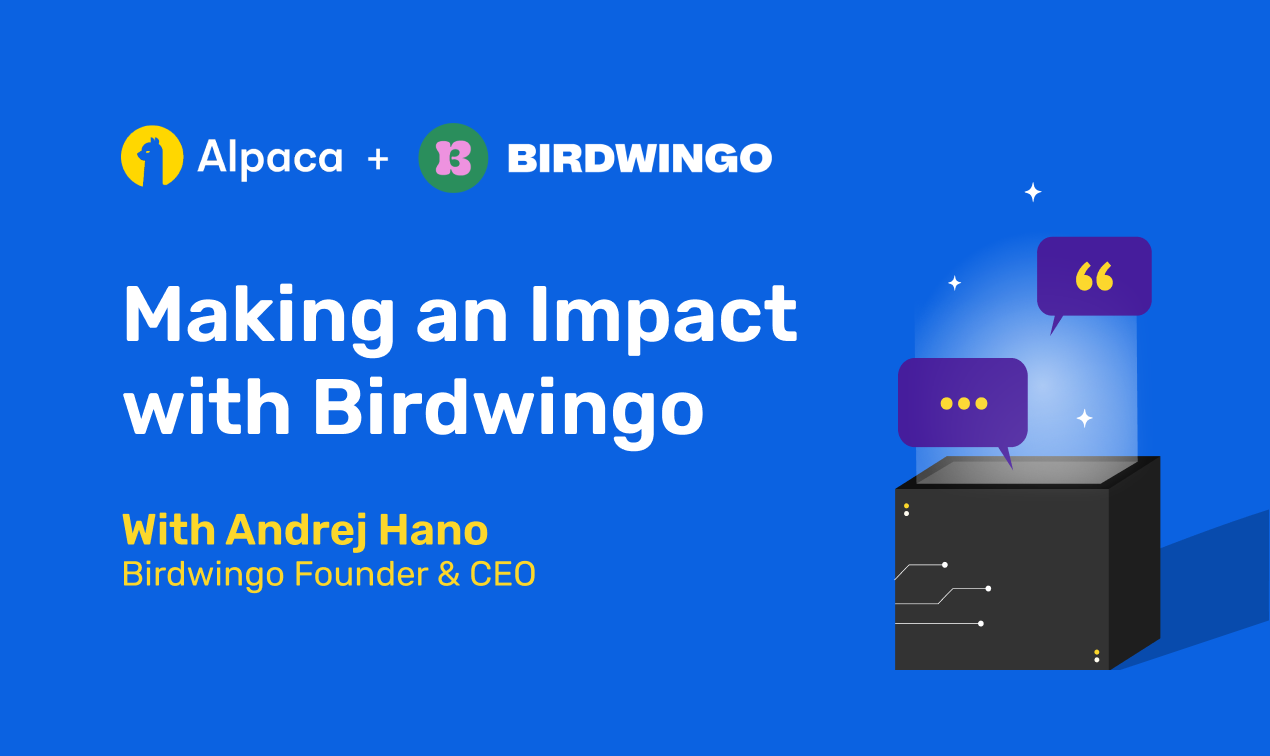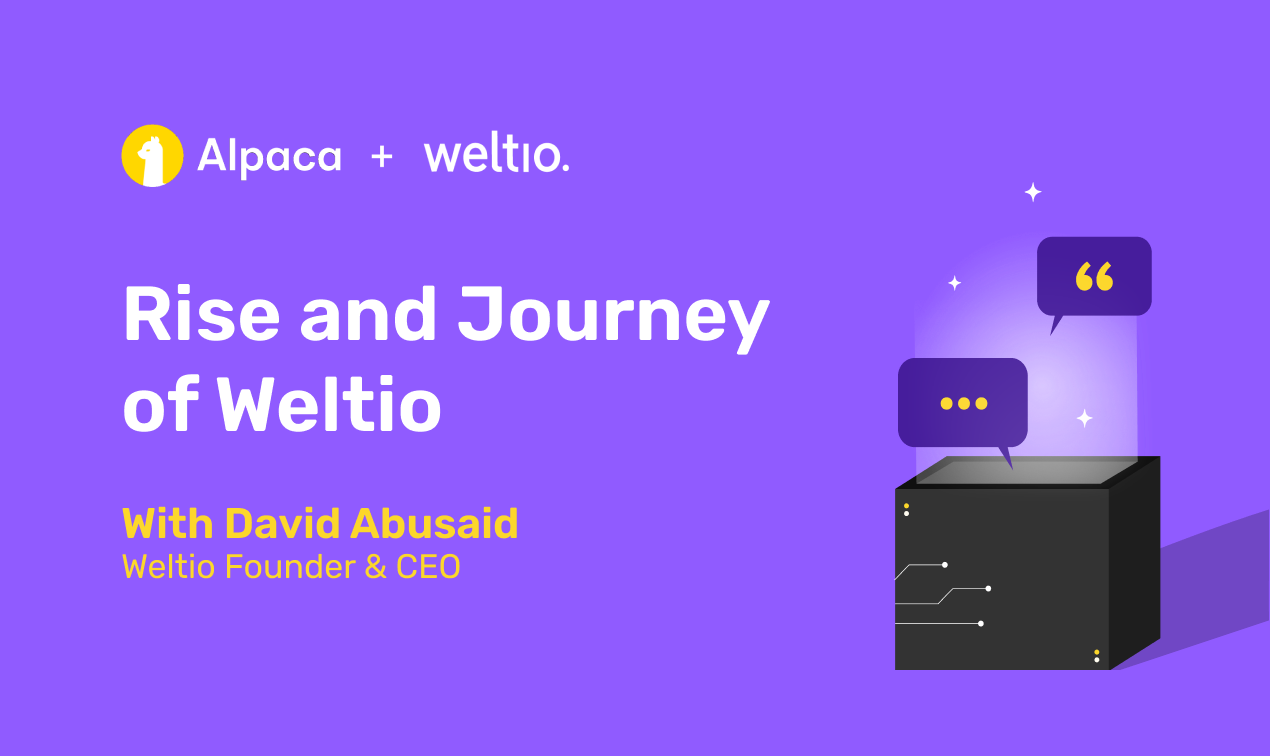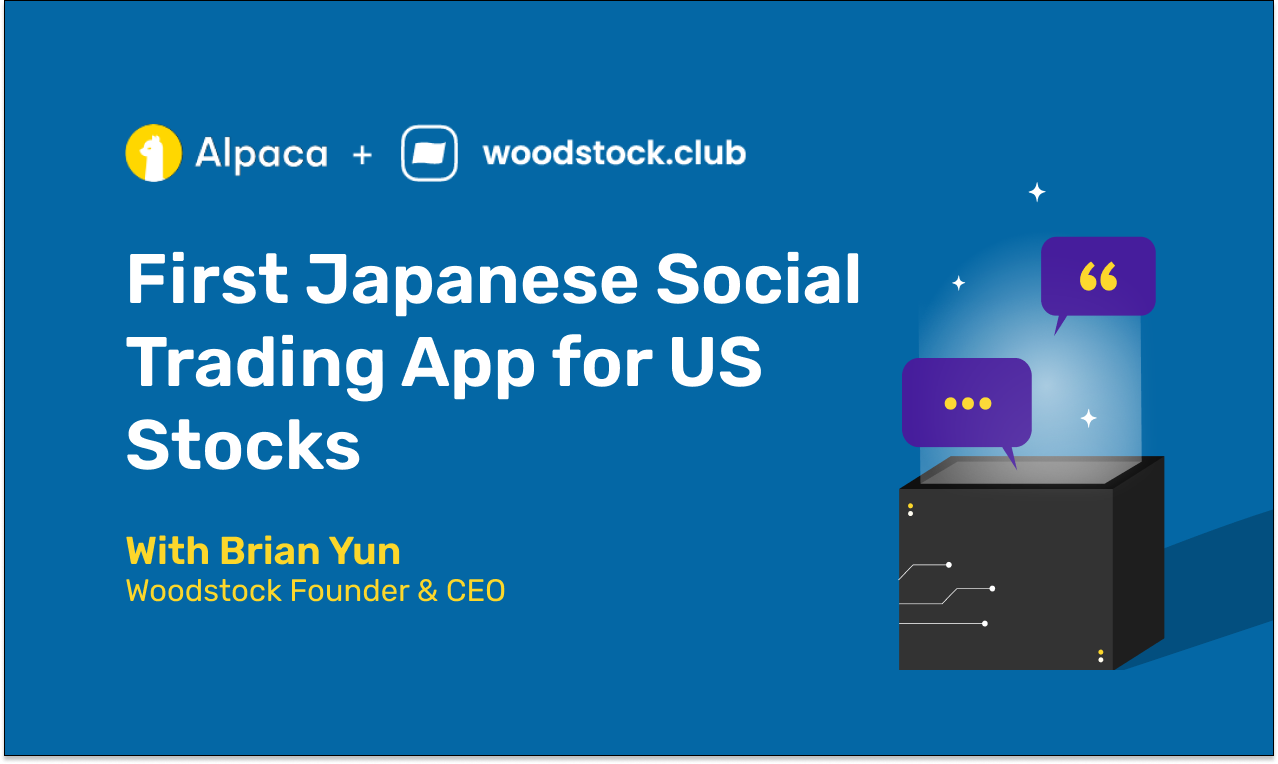
We interview Brian Yun, founder of Woodstock, on the First Japanese Social Trading App for US Stocks.

Woodstock is the first social trading app launched in Japan that offers its end customers US stock notional investing capability.
Watch the whole interview:
Transcript:
Mariangela: Hi, Brian, how are you?
Brian: Hey, hi, good, how are you?
Mariangela: I'm good, good, thank you. So, you're in Japan right now?
Brian: Yeah. Yeah, it's nine AM here in Japan. You're in Mexico City.
Mariangela: I'm in Mexico City. Yeah, it's January 17th for me.
Brian: Nice, nice. So, good evening for you. Oh, are we having connection issues?
Mariangela: It appears that we're live. Ok, hopefully we don't have any more issues. Let's see. Ok, so we have a few people live. So let's get started. So I'm Mariangela Martinez, Content Marketing Specialist at Alpaca. And today we are pleased to be joined by Brian Yun, founder of Woodstock, the first social trading app launched in Japan that offers its end customers US stock notional investing capability. So Brian, could you give us an intro about yourself?
Brian: Yeah. Thanks for having me. Really, good to be here. And it's an exciting time for myself and for the company. We just launched our app and seeing a lot of traction, a lot of new users coming in every single day and just making friends and having conversations about investing, how they think about investing and how they just, you know, as they start their journey. A little bit about myself. I've been living in Japan for about 15 years now. And yeah, the vast majority of my career has been in banking where I traded equities. And that's when I realized, you know, the retail trading in Japan is extremely low compared to other countries. And I was always wondered why that is. And I think there's many reasons for why, but one of the main reasons is that, you know, I think it's the technology and the platform is a little bit behind compared to the peers. So, I just realized that there's an opportunity to really make an impact in this society where the government and the society really realizing the issue of aging population, people don't have enough saved up for their retirement. And people just need to take, you know, to take the leap of faith and learn how the risks work, learn how the volatility, the market works. But invest over time and just build wealth over time, right? So, but it needs to be a, a good, experience. It needs to be fun and it needs to be done in the right way. I happen to spend about 3.5 years at Twitter where I learned. There's a big power in the social conversations, right? So you can use that as a tool to really drive, behavior and people can sort of, make friends and, and sort of, and be, learn how things work. And this is how new generations really learn, to, to consume information, right? So I just, yeah, we're just trying to marry those two things together, make, make investing fun and social. And I, I felt like, you know, we were in the right position to do this company and try to make a real impact in Japan and hopefully in other countries as well.
Mariangela: Yeah, amazing. Well, congratulations on your launching and hope everything's going great and keeps going amazing. So let me go ahead and tell our viewers that any topic talked about in this interview is not financial investment and, or tax advice. We encourage our listeners to seek individual advice should they deem it necessary. And we also ask our viewers if you have questions, feel free to ask and we will answer, if they're in Japanese, I'll ask Brian to help me out because I do not speak Japanese. So let's go into the first question. So what is the story of Woodstock? And you already kind of, gave us a little bit of background in there. And what made you want to create a social trading app?
Brian: Yeah. We like to make this you know, interview as, as you know, interactive as possible. So, we invited our community with talk users as well as our followers on Twitter and our friends this time. So, yeah, please, if you're already on again, I cannot see who's actually on because I'm looking at a different screen. But I can see that some of the YouTube comments if you are already on, feel free to just like throw questions, we don't need to like stick to any specific agenda today. But I think this is what it's all about, right? So, we wanted to make a social investing app because investing is very social. What I mean by that is every single person that I know who started investing. They started because their friends told them they're, they because they're talking to their friends about it, their friend, family about it. Nobody actually like reads newspaper to actually start investing that at least the one that I know, they always need that little bit of encouragement and, and that confidence from the people that I, that they trust, right? So I realized like it's inherently social. And because of that, people are also like excited about sharing what they're going through because market is also inherently volatile, right? Like price moves up, moves up and down every single day and every single second. So there's emotions involved, right? But you know, how do you actually combine investing and social because you cannot detach the two, then we might we should like really embrace that it's social and but try to make a healthy community where people can just be, have a constructive conversation about investment about markets, right? Because it's not about gambling, it's not about just like doing, you know, clicking some buttons, you know, blindly, but it should be really about, you know, how do you develop insights over time and how do you manage the risks in the right way to build wealth over time so that you can be prepared for the rainy days, right? So that this is exactly what our mission is. And we wanted to build a healthy platform where we empower the next generation to build the better financial future and build wealth over time and we hope to build a platform where we just foster a good community of people just teaching each other sharing ideas and develop insights. So that's how they the company came about. The founders, the co-founders, including myself came from different backgrounds. As I mentioned earlier, I spent about nine years in securities firms, trading equities and also spent a few years in the social media company, Twitter. So one of our other co-founders also came from Twitter. So he's also like a huge believer on social conversation, the power that it can bring the change that it can make. And our other third co-founder came from the background of developing systems and back-end securities and full stack sort of development of securities company. So we believe that we thought that we're in the right position and it almost kind of felt like we're kind of destined to do this because if we don't do it, who else is gonna do it? And we kind of have to do it because Japan needs one. Japan deserves a simple app where people even beginners can come and easily make trades and easily learn about investing. And it, you know, it just happened that it didn't really have one before. So we just want to make it super easy and fun.
Mariangela: Yeah. And it's great that, you know, you were the first one to launch in Japan. So you're taking over the market.
Brian: Yeah. Hopefully the first of one of many to come. But we wanted to definitely start with Japan because that's what we that's the country, the market that we feel passionate about. It's also our home market.
Mariangela: Yeah. Right. So, besides helping them, you know, push each other to start trading, you know, with the social trading app. How do you help, how does Woodstock help its customers?
Brian: Yeah. So, when you begin your first investment or even if you're an experienced investor, it's all about, like understanding risks and understanding how markets work, right? And, so, oh, there's the one question, I'm just gonna quickly answer the URL for Woodstock is Woodstock.club not dot com, but .Club because we're a club for all the investors. Coming back to your question. Yeah, so the way we help is, because it's risky, people on like, you know, risky doesn't mean it's negative like the term may give a negative nuance or risk, risk is bad, but risk only just means that it's volatility, it moves, right. That's the definition of risk. And so we just have to understand what it means, right? So the way we help is you want to learn and you want to sort of like start investing, but you don't want to gamble and you don't want to do it with so much capital that you're gonna be at, you know, your actual like family is at risk and that's not what it's about. So, the way we help is we really, try to break the barrier into entry by making it available for a very small amount of money. So, you know, we make it available to access, the US market, so that you can trade with as little as 1000 yen. So that's like less than $10, right? So that means like, you know, you put in $10 even if like the market is not gonna go down 100% but even if it does not go down significantly and, you know, it's like, you know, you learn so much that for just like $10. So, you know, it's really shouldn't be a risky thing to do from, you know, from that point of view. But you, you know, we, we just like, try to make every point of the app about lowering the barrier to entry.
Mariangela: Ok, that's amazing. So, you know, obviously it's a process in trying to launch an app and obviously a trading app has a lot more, you know, hoops that you have to jump. So what have you struggled with the most in building and launching Woodstock?
Brian: Yeah. I think we've been extremely lucky. We have a great team, great supporters, great partners like yourself. And, you know, we also have great tailwind from the macro and government support. But, you know, startup is hard, right? Startup is extremely hard and and especially in Japan, I feel like things move very slow, right? So, sort of the regulation and the, the process and the way that we have to get our licenses, it's for trading and, you know, things take time and I think Japan just being a conservative country, just, you know, it just took a little bit longer time than we anticipated. And that's a little bit of challenge but it goes both ways. We also think that, you know, it's a nice, you know, if it's hard and we met that high bar which which hopefully brings out and, and makes, you know, builds trust with our customers. So, yeah, we're pretty happy with how things have been so far.
Mariangela: Yeah, I mean, things like take time, but once they're out there, you know, it makes it better. It's like a sweet too, you know, for all the struggles that you went through.
Brian: Yeah.
Mariangela: So, how is the trading culture in Japan and you know, Woodstock is going to impact it, but how is it gonna do that?
Brian: Yeah. So, actually like the trading volume in Japan from retail is extremely low. So as I mentioned at the beginning of the interview, it's really one of the reasons why we thought we need to change this in this, you know, we need to sort of like make a structural reform in a sense, like it needs to be done in a big way. So, and the way we try to offer a product to really break that barrier to entry by offering, you know, the product is, you know, that requires as little as this 1000 yen and everything done in local currencies, like, you know, we first started with a product to access US market because that's, you know, our target audience is currently like at the younger generation and they feel excited about the US market and the global capital market has really become tighter last last, you know, few years. So, you know, we're just offering, you know, what we as a minimal product to as a start global sort of the US market. And but, you know, when you think about sort of the Japanese people using their savings to take that leap of faith and try to invest in something. But if it's a dollars and foreign market there's again friction, right? So the way we try to close that gap is we, we try to do everything in local currency so you can, the way I mentioned it, it is 1000 yen, it's not like $9 it's actually 1000 yen. So you don't, you don't ever have to convert into USD and then convert it back. So a lot of the traditional services that are currently offered in Japan, you need to convert once or they do it. But like there's like more steps involved, right? So right now we're quoting everything. You know, you place the order in yen and you get your, you know, value in yen. And then when you, even when you exit, when you sell, you also get it in yen. So everything stays in local currency and it's, you know, low barrier. So I mean, we just try to make these changes so that more and more beginners can really try it. And even if it cost them a dollar or two, it's gonna be a valuable lesson so that they can share their experience with other friends and hopefully their other friends will join and also tell their other friends. So this is a small movement, right? That we try to make and that's why we're called Woodstock. It's like a cultural movement that we try to make in here in Japan.
Mariangela: Yeah. So, you know, you work with Alpaca Japan. So how have they helped Woodstock? And what features do you use?
Brian: Yeah. So, yeah, we're very thankful for the partnership with Alpaca. We're a social company, we're a trading company. Like we do trading on behalf of, you know, customers, but we're more than that, right? Like we offer features like portfolio sharing, people can see other people's portfolios, that's like the main feature, our product has to be inherently a social product. Alpaca has been really helpful so that we can focus on that and specifically on that, like user experience of having people just look at their friends' portfolios and learn how they trade and how they're building their wealth. So the brokerage services, all the behind the scene access to the US market, Alpaca is providing that sort of the service while we focus our energy on building a real fun social product, right? So it's very different, it's very different from other sort of brokerage apps where they just provide the access and they let you just do it. That's more of a functional value. And we have that. But we really focus on the emotional value of the product where you know, I can see, for example, your portfolio, I don't know, I'm just gonna make this up. You have Nike and Netflix or whatever. And I asked questions, hey, why did you buy Netflix yesterday? Did you like the earnings or why are you holding Nike for so long? It didn't go up too much, right? And we can have that kind of conversations and have like build insights. It's not about like whether the price moves up or down today, but it's about building that logical thought process and it has to be the inherent like social element of the product that we're building.
Mariangela: OK. So is it like, can I just look up anyone in the app or do we have to like be friends or something like that?
Brian: We can look up anyone in the app. So, we want it to be an open platform. And this may change, I mean, like just for, you know, because as the app grows, we may adopt some of the, you know, social media features like, you know, what does it mean to share with everybody, right? Do I feel comfortable about sharing with everybody? So right now we're trying to build a culture where everybody feels comfortable. It's OK to share because the concept is so new in this market where it's like, oh it's like, wow, this app, you know, you can actually see people's real portfolios, real life money. It was like, whoa, like, what is this? Right? For a conservative culture in Japan, it's like a real eye opening experience, right? But we're trying to make people understand the value of that and why do you have to be so secretive? Right? It's about learning with each other and we're all trying to help each other. We're not hedge funds, right? We're just retailers trying to learn about the market and trying to invest it, you know, and try to help each other. So we're trying to, we're definitely trying to help build that culture. But over time, I mean, people may have different preferences, maybe people will you know, prefer to share with just their friends and, and that's OK, we want to honor the people's preferences at the same time. So things may change. But right now as we speak, everything is open so you can come in, you can look up people's portfolio, see what if, if that other person decided to share, right? Of course, you can turn that off. But as long as you opened it. You're actually opening up with it, found it.
Mariangela: Yeah, I personally have made some embarrassing trades. So, I don't know if I want to.
Brian: Yeah, I mean, that's the thing. You know, it is very natural to think that you made an embarrassing trade. But it's part of the learning process, don't we all make mistakes? You know, this is not just about investing, right? It's just about life like we all make mistakes, but we, we learn to overcome from that mistake and we grow, right? So I don't think there's any such thing as making real like embarrassing mistake when it comes to investing, you just experience something and it was like, oh maybe it was, you know, not the right type of investment I should, you know, you, you embrace it.
Mariangela: And you learn from, you know, your past trades or past experiences, you keep learning, it's a process and you know, why not?
Brian: Oh, I think there's a question in the window. I like to just quickly touch on that. Is retail investor, customer acquisition cost high in Japan? It's ridiculously high in the US. Yeah. Yes. I think I can believe that it's very high in the US. You know, for us actually, we haven't spent any money acquiring customers up to this point. And we, we hopefully, like if we spend money, we prefer to spend money back, and give it back to customers. That's what we want to do. I don't know if we can forever do that as a business, but we will try to do that as much as possible. Rather than spending on that running advertisements on social media, we'd like to use that for other better purposes for customers. Customer acquisition cost is typically high, right, when it comes to investing because the lifetime value if you have a customer for a very long time, of course, it's very valuable. For us hopefully, it's not gonna be so high because we're a social platform. We are acquiring customers like we acquire like a social media. So that's, and that's inherently built into the product. If people want to see other people's portfolio, they'll join the platform and for that purpose because their friends are in it. And that's how we acquire customers and we hope to do that as much as possible.
Mariangela: Yeah, that's great. So you'll use network effects..
Brian: Hopefully. Yeah, I mean, we are building, hopefully, we will hit that critical mass. It's very exciting that people come in and give us feedback and bring their friends. It's the, you know, it makes my day every single day.
Mariangela: Right. Yeah, I mean, it's good that, you know, you're open to feedback. You know, so you keep the customers happy.
Brian: Yeah. Look at all these Japanese translations. I got my team. Kaku is doing this real time translation. It's actually her first time, first day doing this real time translation. She hadn’t done this before. So yeah. Big shout out to Kanako and you can translate that for yourself. But nice debut on the real time translation. She's so gifted.
Mariangela: That's amazing. Good to have her on the team. So this is a question that we ask, you know, all of the people that we interview and it's kind of fun. So, what do you know now that you wish you had known when you first started out?
Brian: Oh. Yeah, this is a tough one. You know, like to be honest, I feel so blessed because we happen to hire amazing talent and big shout out to the team and also have met amazing partners like Alpaca. So big shout out to you at the Alpaca team as well. And yeah, things just have been really working out well for us and also, you know, huge thanks to our community and early adopters and early users who really supported us along the way. But startup is hard. And, you know, I used to work at large corporations, and I thought I used to think that I worked so hard, but doing a startup and being in this position is, the owner, the amount of, you know, responsibility and ownership and accountability is incomparable to anything that I've done in the past. So it's definitely not easy. And, you know, to your question, I wish I had, you know, prepared myself a little bit more emotionally about like, what I'm about to get into. But, but it's really fun though. I'm learning a lot about myself at the same time. Like I'm just learning to be a better human being. I feel like, oh, I, now I have to take care of the team and it's not about me anymore and like, you know, you know, we have a mission. We have, we're trying to do something big. And we're trying to reform how people manage their finances and how, how people build their wealth over time. I feel like so super responsible for that. And if we, if we succeed, we're gonna help so many people's, we're gonna change so many people's lives. Right. So it's a big, big impact that we want to create. So it's very exciting but at the same time, you know, a lot of sleepless nights, a lot of emotional volatility. But yeah, thanks to all the support to the team and from the team and everybody around me, family friends and, you know, have really have been so amazing. So, yeah, I feel super grateful and lucky.
Mariangela: Yeah, that's amazing. A lot of responsibility. I think definitely it's not the same to have a job then, you know, own a company and be responsible for other people. So, yeah.
Brian: Yeah. Yeah, if anybody is thinking about it, even those listeners who are on right now, wanna just, you know, chat about maybe starting an entrepreneurship or, have some idea. But, you know, a little scared to take that leap of faith, feel free to ping me and I'd love to, you know, talk about it and, you know, hopefully share my experience so far and I love doing that with other entrepreneurs. So I actually feel like, yeah, I'm the right fit for entrepreneurs. I wishI had known, known that earlier. So I can do this earlier but better late than never.
Mariangela: Exactly. Better late than never. That's true. So where, you know, if they want to contact you, where can they find you or where, where can they find more about Woodstock?
Brian: Yeah. So, Woodstock.club is our domain, our website, you can find the information about us. We're also on social media like Twitter @WoodstockClub is our handle. We also have Instagram Woodstock.club, and YouTube channel, we just started Woodstock videos and that's our short handle for YouTube. We also have a LinkedIn page. If you just, if you search for Woodstock club, you should be able to find it. Yeah. Yeah, but it's hard. It's so much work to actually manage all these social channels and yeah, huge. Shout out to you, you're doing this amazing live interviews. It must be pretty..
Mariangela: It's fun.
Brian: It's fun, but at the same time, you must do a lot of logistical work and behind the scene work to manage this processes. So, yeah, big thanks to you.
Mariangela: This is like final line, you know.
Brian: Exactly. Exactly. Yeah.
Mariangela: Yeah. So that's amazing. So actually the Woodstock linkedin and your personal linkedin are tagged on the post, on the linkedin post. So if they can just click on it, you guys will find them very very quickly, also on YouTube they're tagged in the description so you can go to their videos. Brian, thank you so much for, you know, giving the time. I know it's 9 AM. You probably have a lot of things to do, but it's amazing that, you know, you gave us the time and are here with us and we're so happy to be working with you and congratulations.
Brian: Yeah, huge thanks to you. Thanks for taking the time and giving us this opportunity to share our story. And yeah, we really enjoy the partnership with you guys and hope to really bring a big positive impact in Japan and beyond. So, yeah, let's work together.
Mariangela: Thank you so much.
Brian: Thank you. You have a nice rest of the day.
Mariangela: Thanks. You too.
Brian: Thank you.
Mariangela: Bye bye.
Brian: Bye everybody. Thanks for listening.
Contact Us
Learn more about Broker API:
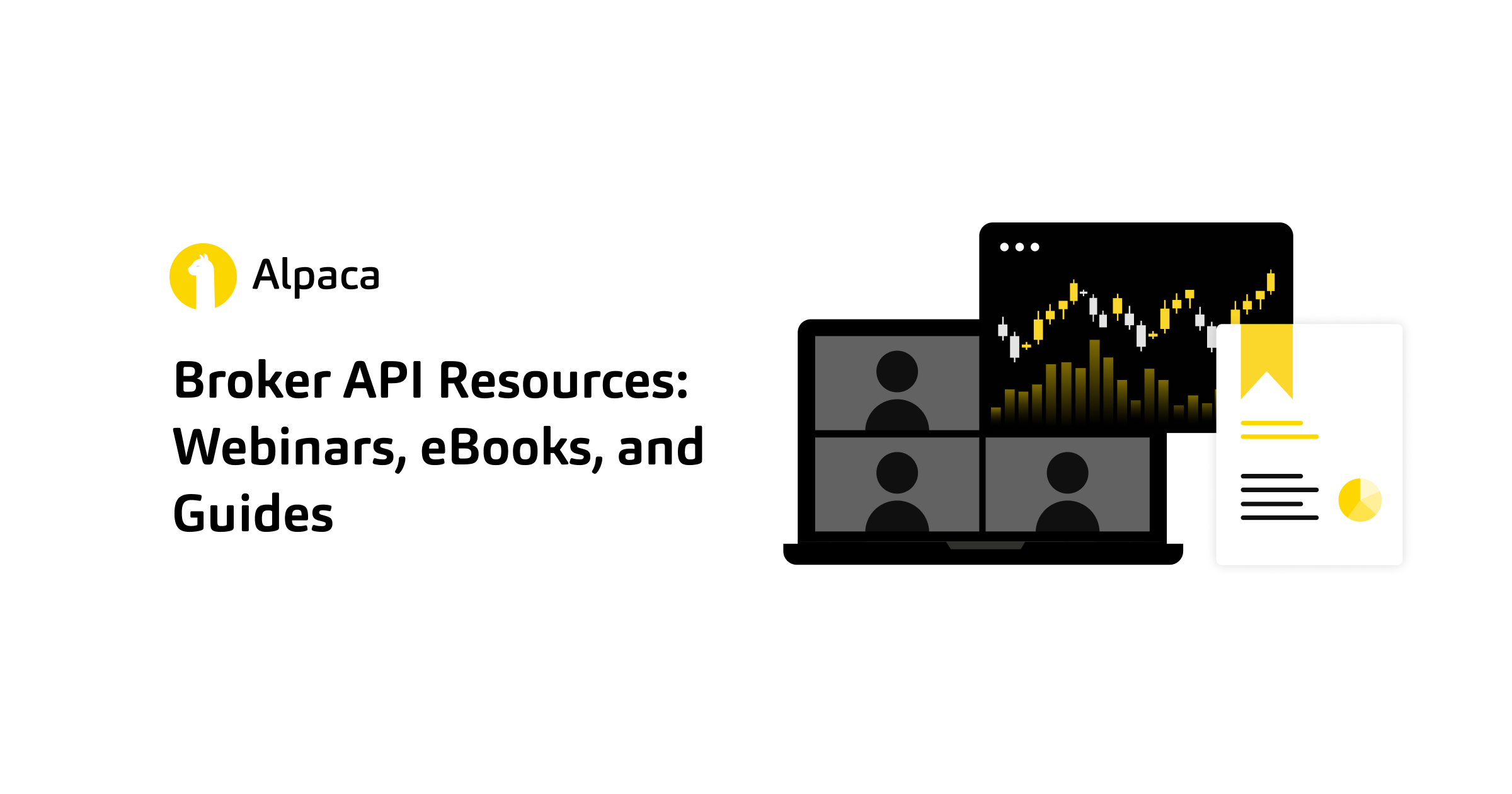
All views and opinions expressed by the guest speakers are solely their views and opinions and do not reflect or represent the views and opinions of Alpaca Securities LLC, Alpaca Crypto LLC, AlpacaJapan, and AlpacaDB. The guest speakers' opinions are based on information they consider reliable and therefore Alpaca Securities LLC, Alpaca Crypto LLC, AlpacaJapan, and AlpacaDB do not warrant its completeness, accuracy and it should not be relied upon as such.
The content is for general informational purposes only. Alpaca Securities LLC, Alpaca Crypto LLC and AlpacaJapan do not recommend any specific investments, investment strategies or cryptocurrencies.

